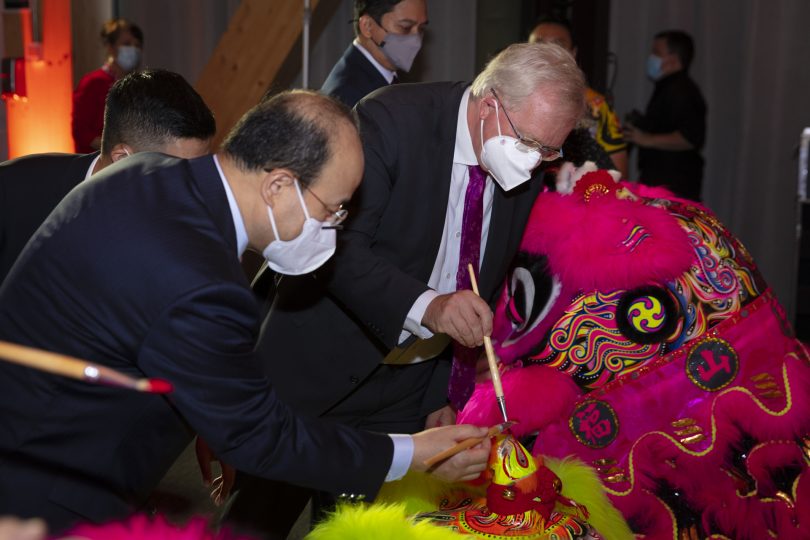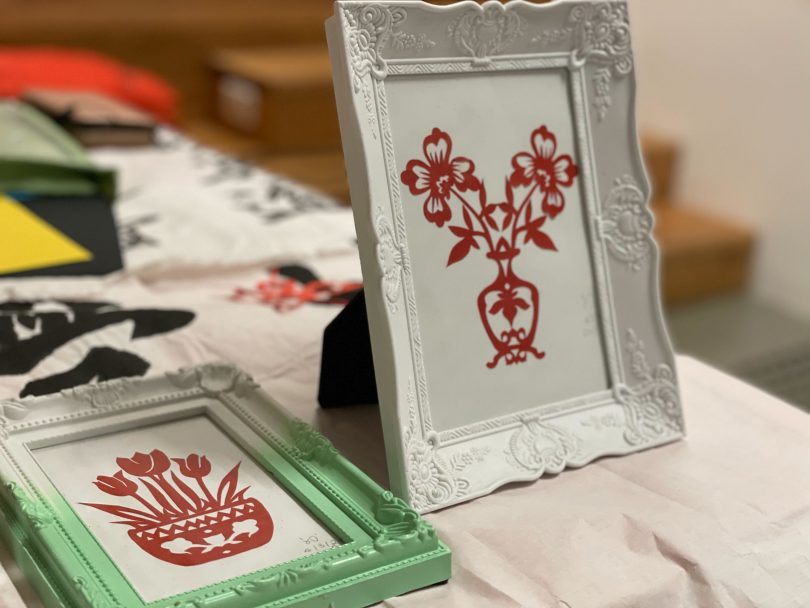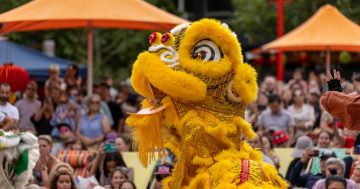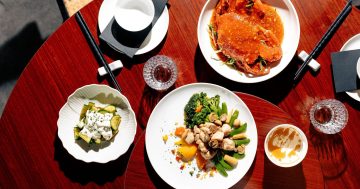
Ambassador Xiao Qian and Professor Brian Schmidt dotting the lion’s eyes. Lunar New Year Celebration, ANU. Photo: Thomas Lucraft.
In the Year of the Tiger, courage, bravery and strength are recognised.
The Australian National University and Canberra’s Chinese community celebrated Lunar New Year on campus last Saturday (26 February). The warm welcome from the University also encourages friendship and a strong connection between international students and the local community.
The event featured traditional Chinese instrumental performances, lion dance performances, calligraphy, origami and paper-cutting demonstrations, games such as Mahjong, Chinese chess, and a screening of Shang-Chi and the Legend of the Ten Rings.
As a multicultural country, Australia has embraced and enjoyed Lunar New Year celebration for years, breaking down cultural barriers and strengthening mutual trust between international students and local communities.
According to ANU Vice-Chancellor Professor Brian Schmidt, “it is really important for us to enjoy and immerse ourselves in the culture. It’s not just a festival tradition, but also one of inclusion”.
“The celebrations played an important part of Australia’s migrant history, and of course, Lunar New Year is now embraced by Australians across the continent.”
Professor Schmidt also noted the 40th anniversary of the ANU’s Memorandum of Understanding with Beijing University in 2020 and looked forward to fostering the relationship in years to come. This year also marks the 50th anniversary of establishing the relationship between China and Australia.
“I couldn’t come at a better time,” said China’s new ambassador, Xiao Qian.
“I’m ready to work together with our colleagues from Australia to review the past, to see what we have achieved over the past decades, and to look to what more we can achieve to the benefit of our two countries.”

Lion dancers perform for Lunar New Year celebrations at ANU. Photo: Thomas Lucraft.
About 8,000 Chinese students were living and studying in Canberra each year before the pandemic, and they are an important part of exchanges between both countries and their cultures.
“They are the seed of the friendship … They will be the future bridges of the friendship and cooperation between two nations,” Mr Xiao said.
“And hopefully as the pandemic situation improves, we can resume normal university to university education, repeating the flow of students from our two countries, and together, we will make our relationship better and stronger.”
The celebration also aimed to enhance the contact between international students and local communities in Canberra.
“We would let students know that they can also get support from the community,” said the president of the ACT Chinese Australian Association, Chin Wong, who played an important role in coordinating this event.
“We’d like to share the traditional culture through these performances, and hope the hand of friendship endures between two nations.”

Papercutting art. Photo: Laura Liu.
Like many returning international students, Anna Qin cannot be with her family. She joined the celebration at the ANU and said the event created a strong sense of belonging for her.
“It was very inspiring, especially the ‘lion-awakening’ ceremony, which I haven’t seen before. I can feel the culture of Chinese New Year here,” Anna said.
The lion dance is a traditional custom during the Lunar New Year.
The ‘lion-awakening’ ceremony, involving dotting paint onto the lions as a symbol of life-giving, brings people liveliness and happiness and prosperity and good luck.
“This successful event demonstrated how collaborative, professional and proud the Chinese community is in sharing the joys of their culture to Canberra,” Prosperous Mountain Dragon & Lion Dance Association leader David Wong said.





















